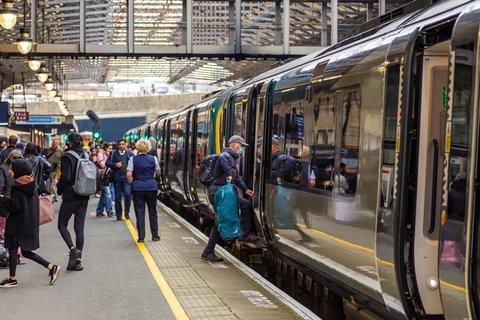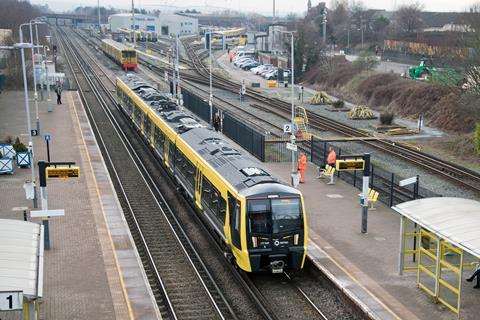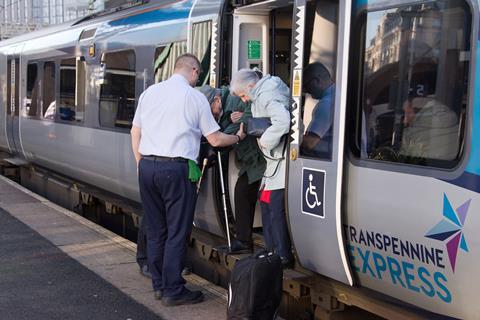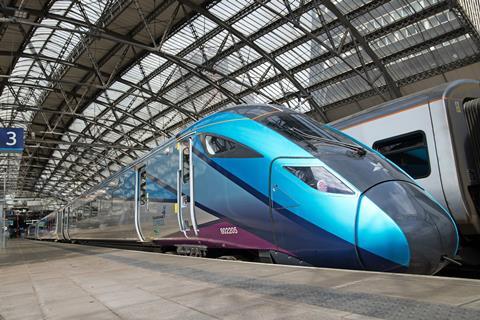
UK: TransPennine Express has confirmed more details of the trainsets which are to be ordered under the procurement process which was launched following the confirmation of the latest £3·9bn tranche of funding for the Transpennine Route Upgrade programme.
Expressions of interest were invited in December, and invitations to negotiate are expected to be issued to selected manufacturers in April. Contract signing is expected in July 2025, with delivery, testing and staff training in 2028-30 and entry into service ‘aligned to key TRU outputs’ from 2029.
The order will cover an initial 29 five-car trainsets, with an option for up to 55 in total. TPE says these will be ‘multimodal to take full advantage of the upgrades delivered by TRU and to support decarbonisation and sustainability requirements’.
In a recent presentation to stakeholders, the operator explained that electrification of the North Transpennine route between Manchester, Leeds and York means that its diesel-only rolling stock needs to be replaced, and ‘longer, higher performing’ bi-mode or multi-mode trains are ‘essential to deliver the benefits of the Transpennine Route Upgrade’.
The trains will be needed to support the increased service frequency between Manchester and Leeds, where — in conjunction with Northern — six trains/h will operate over the upgraded line. To meet capacity requirements, all services will be formed of at least five cars, bringing an end to the operation of three-car DMUs. Each new train will be up to 195 m long, with a maximum speed of 200 km/h.
Maintenance options are still under consideration, but it is expected that the order will include purpose-built facilities to maximise reliability.
Lessons learned

TPE says it has drawn lessons from its own recent experience of rolling stock procurement as well as wider work undertaken at an industry level; this has included engagement with the Liverpool City Region to learn from its Stadler Class 777 EMU programme.
The project will reflect the Rail Safety & Standards Board’s latest Key Train Requirements and Rail Delivery Group guidance which has drawn together the experience of other operators.
TPE says the process is being led by the people who will use, operate and maintain the trains; senior managers have been critical of previous procurements from the ‘franchising era’ where new trains ordered by people involved in the franchise bidding process proved complicated to operate and maintain or did not meet the aspirations of those who would actually use them.
The specification programme has already seen work by an industry ‘hothouse’ panel chaired by Northern Managing Director Nick Donovan which involved the Great British Railways Transition Team, various technical advisors, Network Rail, the Rail North Partnership and Northern Trains.
Engagement with the ASLEF and RMT trade unions has commenced, and 1 600 customer surveys have been completed. Consultation has taken place with user groups including the Disabled Persons Transport Advisory Committee, Active Travel England and Transport Focus and TPE has engaged with Transport for the North and the Department for Transport. Further employee and customer focus groups will be consulted as the specifications are refined.
One type of train

Despite some initial resistance from DfT, TPE has agreement that it will only introduce a single type of new train, reflecting on the lessons from its previous, over-complicated fleet programme.
TPE says it will take ‘a system design approach’ with the procurement assessing ‘all requirements including depot, maintenance and operations to avoid repeat of the Nova 3 challenges’.
Aware of delays to many current new train programmes, TPE says it will ‘ensure prudent scheduling and risk management’, with measures expected to include a contingency plan to maintain a float of existing trains ahead of the expiry of lease agreements.
Operations

The working assumption is that the new trains will be deployed from 2029-30 to enhance serves on the North Transpennine route between Manchester and Leeds. The trains will enable improved links to and from Manchester Airport, Newcastle and Hull.
The current thinking is that Newcastle services will continue to be operated by Hitachi Class 802s, but there will be an option to replace these with new trains.
The retention of some or all of the Siemens Mobility Class 185 DMUs depends on the final number of new trains procured and any other capacity uplifts that may be agreed.



